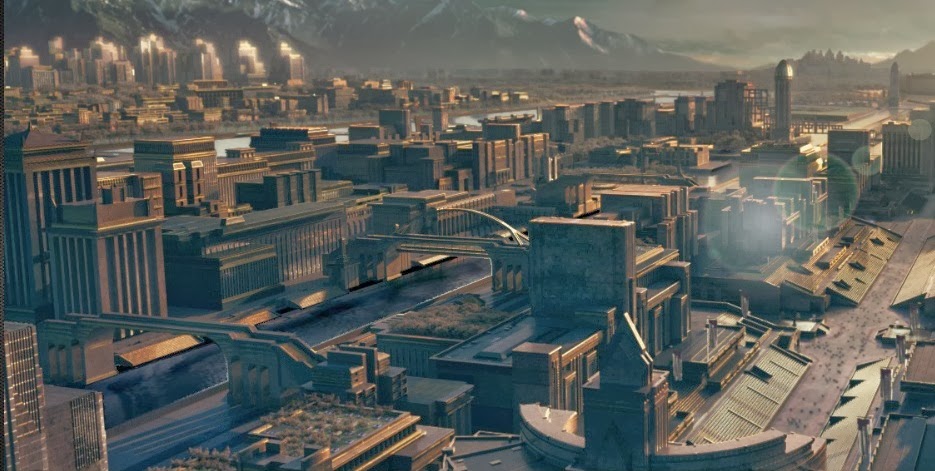The entire trilogy is about a social revolution – a push
against capitalism.
Many people have connected the Hunger Games to propaganda for
anti-capitalism, and I can see how these connections are formed. The basic idea
of Hunger Games portrays Capitalistic views. The Capitol is high in power,
rank, stature, and economic wealth and because of this the Capitol holds all of
the power.
The Capitol in Hunger Games is what makes the grandest
profit. They run all of the districts and make the citizens work hard for little
pay, and the capitol keeps majority of the profit. By using the other districts to support their
luxurious lifestyles, the Capitol develops to be rich, strong, and superior. No
one from the capital would be caught dead working the land, in any style.
Even the layout of the city is supposed to evoke emotion. The
designers talk about how when creating the image for the capitol they looked at
images of communist Russia and it’s concrete structure for inspiration. As a
child, we were all taught in History Class the horrible things that had occurred
in communist Russia. By modeling the Capitol after the images we’ve seen about
communist Russia, the designers create a clear connection comparing the
capitalistic Capitol to Communist Russia. This connection causes the audience
to think negatively towards capitalism.
Designing the capitol - http://www.youtube.com/watch?v=PAQqQWNFN7A
The Capital
The Capitol is a dictatorship. And the citizen
chose to revolt again the capitol. Because the trilogy itself is about a revolt
on the capitol, many people have thought the underlying message of the trilogy
was a positive push against capitalism.
Now the entire book portrays the capitol in a negative light.
They are controllers, they are evil, and they are even depicted as somewhat
subhuman. And but that I mean with the way they dress, the grandness, bold
colors, and pristine style, the Capitol’s people are made to look fake and
force – in order for us to see them as different. This causes the audience to
hate the capitol, and its dictatorship ways. Because of the way the capitol
treats people, a form of hatred is generated in the audience.
Capitol Fashion
Because of the blatant hatred towards the Capitol and all of
its people, the audience is excited to see the capitol overthrown. A passion
for anti-capitalism builds in the audience. This trilogy is a cry against
capitalism, with a love story subtly woven into order to slowly coerce the
audience to take the writer’s position.
The Hunger Games itself is designed
to scare people away from the idea of revolting, in addition to providing a
show for the people of the capitol. By taking innocent children, and pinning
them against each other, the capitol instills fear throughout the districts.


ReplyDeleteI really like how you portray the Hunger Games as a fight against capitalism. The entire time I read the book/watched the movie I thought to myself that it was a hyperbole for modern day government, or specifically capitalism. The book takes real things going on in our country today to the extreme to better help the audience understand the story. For example, the discrepancy between the rich in the poor is something we see both in our nation and in the Hunger Games, although in America the discrepancy is not as apparent as in the Hunger Games and is often times over looked. I think something we can also draw similarities from is the control the rich or the Capital has over the people living in the districts and the way the rich have control over the government in the U.S. Like you said, the Capital controls the districts, making the citizens work for little pay, and the Capital reaping most of the profits. Many people in America do not realize how much control the wealthy actually have over our government and therefore, the people. Also, the people in the districts have little control over their financial stance and have no opportunity to change that stance. In America, we like to think of our nation as the land of opportunity and we believe in the "American Dream," which tells us that if we work hard enough we can climb the ladder, that one day the mail room job we work could turn into us being the President of the company. These jobs and this idea rarely exist anymore. Many Americans live below the poverty line with little hopes of climbing above it. This article from CBS helps better explain this idea: http://charlotte.cbslocal.com/2013/07/25/poverty-in-america-why-its-difficult-to-climb-out-of-poverty/. What I like about what you say the Hunger Games represents is a revolution. The people rise above the suppressing government to instill what they believe to be right. What I would like to know is how young audiences view the Hunger Games? Do you think they can cognitively understand this message, or do they just see the Hunger Games as a cool, violent, love story? I even think about our age group and I wonder if people take the ideas present in the Hunger Games seriously. I wonder if people see that although the Hunger Games appears as an extreme, that the ideas aren’t that far fetched? That similar things are happening right in front of us, in our own government?